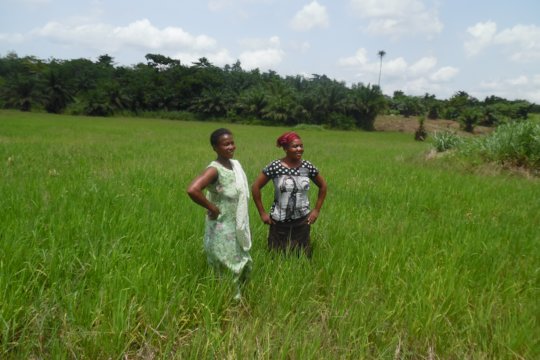

Adankwame farmers with rice inputs
“I am scared to death about fall armyworm,” Dr. Pedro Sanchez said in the opening day of the World Food Prize’s 2017 Borlaug Dialogue. “The fate of African food security hinges on addressing this clear and present danger.” That’s why the World Food Prize Laureate is calling on the world’s scientists to develop a comprehensive response to the pest, and to share that knowledge and the necessary resources with the smallholder famers on the front lines as quickly as possible.
Fall armyworm first arrived in Africa in January 2016 and can fly up to 100km in one night. It has now spread to more than 28 countries in Sub-Saharan Africa, including Ghana, and destroyed more than 740,000 acres of maize on the continent, the staple food for more than 200 million Africans (Sierra Club).
Our team in Ghana identified the threat posed by fall armyworm at the start of this year, and in February, met with farmers at Adankwame to discuss production for the upcoming planting seasons. Last year, Self-Help provided technical and financial support to the seventeen women in Adankwame Farmers Association. They were trained on improved agronomic practices and given loans to purchase seeds, fertilizers and herbicides to produce maize. Despite poor rainfall, the farmers were able to cultivate Quality Protein Maize (QPM) and after harvest, paid their loans in full without default.
However, with the emergence of fall armyworm in their farm lands, they were hesitant to grown QPM this year. There are no known measures to prevent fall armyworm infestation, there is insufficient pesticide available on the market to control the pests, and due to low rainfall, QPM yields the previous year were not encouraging, meaning that if the pests arrived, their yields would suffer further.
“Information from the Ministry of Food and Agriculture has it that there has been Fall Armyworm attack on farms in our district and the attack is severe on maize. We have therefore decided that we shall not cultivate maize this year. We shall cultivate rice instead,” said Fatima, Chairwoman of the Adankwame Farmers Association.
While Self-Help encourages farmers to grow crops with enhanced nutrition such as QPM and the orange fleshed sweet potato which is rich in Vitamin A, we are prepared to support farmers to do what is best for their families based on the information available.
It is uncommon for smallholder farmers to be this decisive, especially when loans are involved. Many smallholder farmers have defaulted in repaying their loans because they failed to critically assess loan conditions as compared to projected yields. Late disbursements, unfavorable climatic and market conditions have contributed towards high loan defaults among smallholder farmers.
Yet training smallholder farmers to be knowledgeable in their operations, providing them loans on time and linking them to appropriate sources of information enhance their contributions to food security. We supported the seventeen women with input loans for rice production to ensure their families had an adequate supply of staple crops for consumption and sale and delivered the inputs to the farmers in March. The farmers were so delighted to receive the inputs on credit and on time.

Adankwame rice farmers survey the crop
In June, we visited the farmers and they were anticipating good yields. In September, they reported that the inputs provided by Self-Help have indeed helped to increase their yields and profits. Fatimatu, one of the group leaders said, “None of the seventeen of us can say that her farm did not produce enough yield.” She continued, “I visited all the seventeen farmers’ farms and assisted with harvesting and know what I am talking about.”
All seventeen farmers repaid their loans in full on time – in fact, 10 women even repaid the loans ahead of schedule saying they harvested and sold the rice earlier than expected, allowing them to enjoy the profits and repay the loans early to allow the funds to be used to help other women in need of financial support. The group requested assistance with input loans again during the minor growing season in November in order to free up funds so they can better meet their children’s needs between harvests. With your help, we hope to support the women again in the minor season, as well as ten new participants who have joined the group after seeing the successes of their neighbors during the major growing season.
Ensuring food security is everyone’s responsibility. All hand must be on deck! Thank you for helping families in Adankwame adapt to changing conditions, make informed decisions, and better feed themselves!
Stay tuned for how we supported farmers who opted to grown QPM for the school feeding program in spite of fall armyworm attack!

Powered by Wapiti Digital #servetheherd
This is my rich text.
This is more rich text.
I am a list
Lists are cool
Fighting Back Against Fall Armyworm, Part II – Self-Help International says:
[…] in Ghana, discouraging farmers and reducing their interest in maize cultivation. Some farmers, such as the Adankwame Farmers Association, opted to cultivate rice instead of maize in the major growing season (April – September) due to […]